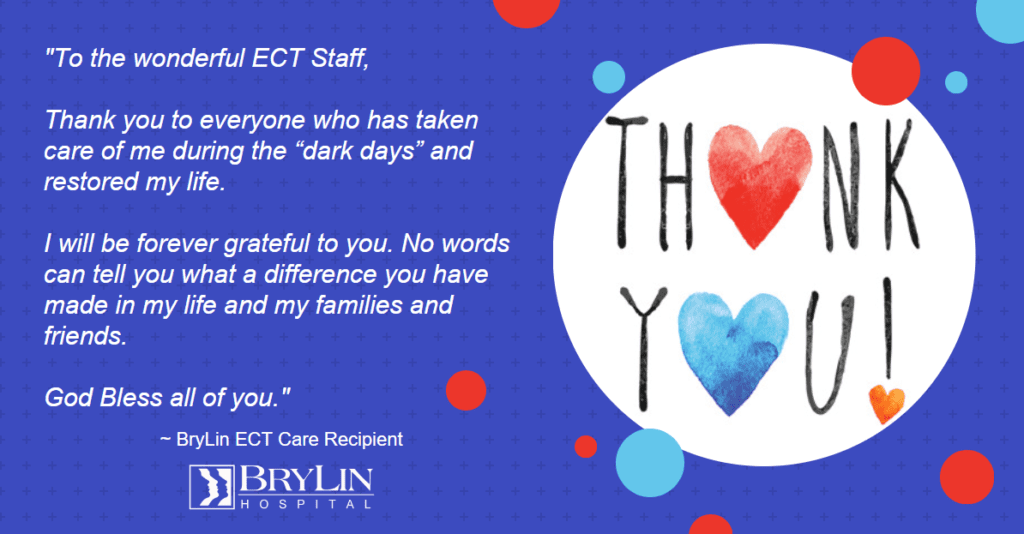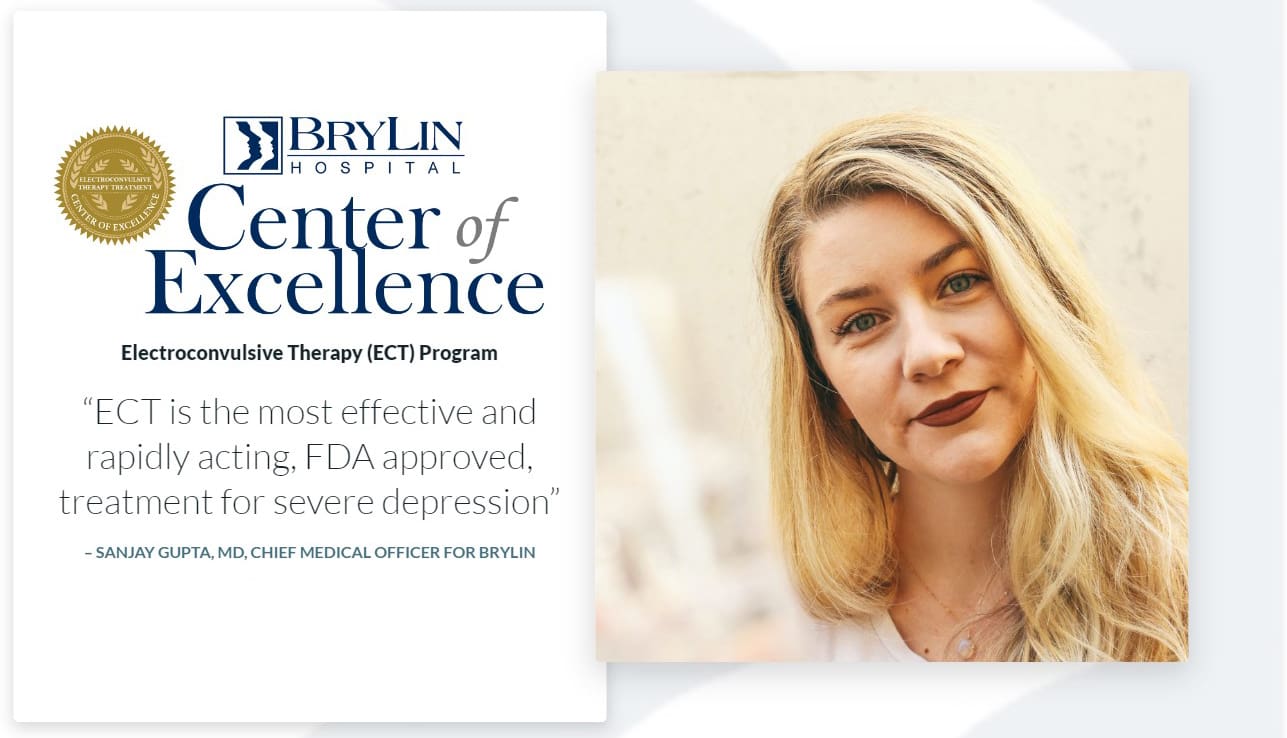BryLin’s Center of Excellence in Electroconvulsive Therapy (ECT) Program, led by our Chief Medical Officer Sanjay Gupta, MD, is designed to foster integrated, evidence-based approaches to prevention, early detection, and treatment of a multitude of mental health diagnoses.
The National Council for Mental Wellbeing and Dale Jarvis and Associates helped develop a Behavioral Health Center of Excellence framework for behavioral health service providers nationally and identify practice guidelines.
“This Center of Excellence designation recognizes BryLin’s ECT program as demonstrating a level of excellence within a set of expected standards set nationally. We’re very proud of this accomplishment”, said Eric Pleskow, President/CEO.
A Positive Place for Service Recipients to Begin Healing
BryLin’s state of the art ECT Department is the only ambulatory – outpatient ECT Center in Buffalo and throughout Western New York.
We offer:
- Personalized care from our highly trained, compassionate staff.
- The highest quality medical care and safest practices.
- A therapeutic space that is warm, inviting, and positive.

Patient Testimonial – ECT
Our Electroconvulsive Therapy (ECT) Treatment Team
Our ECT Program includes a highly qualified team of anesthesiologists, registered nurses, and support staff. Our Chief Medical Officer, Dr. Sanjay Gupta leads a team of psychiatrists who will work closely with you and your family to provide the very best care possible.
How Does Electroconvulsive Therapy (ECT) Work?
- The ECT procedure involves electrical stimulation to the brain while a person is under anesthesia.
- A controlled seizure is induced to improve chemical pathways in the brain that effect mood and behavior.
- During the procedure, an anesthesiologist provides a general anesthesia medication, airway management, and knowledgeable guidance.
- A highly experienced physician determines the proper amount of stimulation and duration of the seizure.
- Recipients receive between 6-12 treatments over a 4-5 week period.
- Some people may see their symptoms improve as early as a week or two.
Who Can Benefit from Electroconvulsive Therapy (ECT)?
- Each year, approximately 100,000 patients receive ECT in the U.S..
- In 1978, the American Psychiatric Association ruled that ECT was both a safe and effective form of treatment for cases of major depression and other mental illnesses, such as bipolar disorder and schizophrenia.
- It’s also used for people who require a rapid treatment response because of the severity of their condition, such as being at risk for suicide.
- Clinical evidence indicates that for individuals with uncomplicated, but severe, major depression, ECT will produce substantial improvement in approximately 80 percent of patients.
- ECT is typically used when other treatments, including medications and psychotherapy, haven’t worked.
Ketamine vs ECT
In the first head to head study comparing Ketamine and Electroconvulsive Therapy (ECT) in the treatment of severe depression, researchers at Lund University in Sweden found Electroconvulsive therapy (ECT) to be superior to ketamine infusions, both in terms of higher remission rates and with a greater reduction of depressive symptoms.
A total of 63 percent of the patients in the ECT group recovered after treatment, compared with only 46 percent among those who received racemic ketamine intravenously. The study also found that older patients (51 – 85yoa) seem to respond better to ECT than ketamine, whereas younger patients seem to respond similarly to both ketamine and ECT. The conclusion of this study found that, given the high remission rate, in particular for patients who are older or present with psychotic symptoms, the superior efficacy of ECT must not be ignored (see results of the study here).
Another comparison between the two is often the cost. Ketamine infusions are not an FDA-approved depression treatment and, as a result, they are unlikely to be covered by insurance. Overall cost can also vary with initial treatments consisting of one or two infusions a week for approximately three weeks. With follow-up infusions every few weeks there-after, Ketamine infusions can be an expensive treatment option for depression. Conversely, because ECT is an FDA approved treatment for major depression, most insurances will cover the cost making it a much more affordable option.
⇒WATCH THIS SHORT VIDEO – Electroconvulsive Therapy (ECT): Treating Severe Depression⇐
Electroconvulsive therapy (ECT) remains the most effective treatment for severe depression and Treatment Restive Depression (TRD). This video provides an introduction to ECT for patients, family members and clinicians that may be considering this treatment option.
Will Insurance Cover Your ECT Treatments?
- Maybe just as important as ECT’s effectiveness is the cost.
- ECT is covered by most health insurance plans, Medicaid, and Medicare because of it’s proven history of success!
- Call us today and we can check your insurance benefits for you.
Is ECT Right for You?
- While Electroconvulsive Therapy (ECT) is a proven treatment for most mental health issues, it is medical procedure that needs a Physician or Nurse Practitioner’s request or referral.
- Please speak to your mental health provider (psychiatrist or psychiatric mental health nurse practitioner) at your next scheduled appointment about ECT as a possible treatment option.
- If both you and your provider believe you may benefit from ECT, please have the provider’s office (psychiatrist or psychiatric mental health nurse practitioner) reach out to us.
To learn even more about ECT, visit ⇒ What You Need To Know About ECT
Download/View our ECT resources:
• See here for Pre & Post Ambulatory Electroconvulsive Therapy (ECT) Instructions ⇒BryLin Ambulatory ECT Instructions
• Download the BryLin Electroconvulsive Therapy (ECT) brochure here ⇒Center of Excellence ECT Program Brochure
• Please see our FAQ page HERE for more information about ECT.
⇒ Are you a Psychiatrist, Psychiatric Mental Health Nurse Practitioner (PMHNP), or Psychiatric Physician Assistant (PA) looking to refer your patient for ambulatory ECT?
⇒ Are you someone interested in learning more about ECT and if you may be a candidate for treatment?
Please call the ECT Department directly at 716-886-8200 ext. 2196 and we’ll be happy to help you.

Are You Struggling with Mental Illness/Your Mental Health?
If you’re struggling with depression, anxiety, bipolar disorder, PTSD, or other mental illness…. You’re not alone. Many people have feelings or experiences like yours at some point in their lives. When such experiences become severe, some people need to reach out for help and treatment. Call BryLin to speak with a licensed professional at (716) 886-8200 or Contact Us Today!
With HELP, There’s HOPE℠



